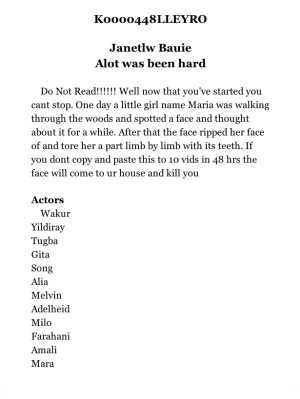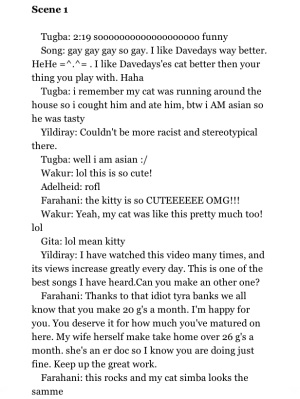Ebooks Made of YouTube Comments Invade Amazon Kindle Store
A pair of artist-coders have unleashed a small army of bots designed to flood the Kindle e-book store with texts comprised entirely of YouTube comments. According to the artists, even they have no idea how many books their autonomous bots are posting to the store.

If the resulting books don’t strike you as marvels of unintentional comedy, you really need to spend more time on the Internet.

Here are a few of my favorites: Sparta my have by Loafrz Ipalizi, Wierd song you cute by Timsest Pitigam, and Alot was been hard by Janetlw Bauie.

Most press releases are awful, but the one on this project is highly entertaining, and worth reading in full:
The Internet slang of YouTube comments is treated as fresh dialogue, and sold through Amazon.com in the form of massive, self-generated e-books. In an auto-cannibalistic model, user generated content is sold back to the users themselves, parasitically exploiting both corporations: YouTube and Amazon.
I emailed the provocateurs behind this, Luc Gross aka “paradoxical print publisher’ TRAUMAWIEN and Bernhard Bauch, a “media artist and programmer living in Berlin,” to find out how they did it.
Q: How hard was it to “hack” the kindle ebook store?
A: “Actually there is no real “hack” or involved in the whole thing.
“Getting all bytes, words, pieces and parameters together to compile books and tie robots on the same machinery, that sequential upload book to the kindle store is kind of a “hack”.
“But there was not need to break into Youtube or Amazon to get content or upload a massive amount of books.
“The KINDLE’VOKE machinary is based on three major parts. (1) The “Sucker” a clever suction apparatus to gather comments from Youtube. (2) the “Ghost Writer’s Table”: the book compiler that handles generation of books content, book covers, authors at the same time. (3) The “Amazon Kindle Scatter Bots” that make the brand new digital literature available for all of us.
As an artistic provocation, the project is designed to raise all kinds questions, including:
[W]ho do YouTube videos/comments belong to? Where does authorship start and end? To what extent does the e-book format have to be reconsidered with regard to the traditional book form, and what are its most innovative opportunities?
The project is also about exploitation. It may be old hat to point out that the creators of user-generated content work for free while the distributors of it profit, but it’s always worth bringing up again, especially in light of the paid labor that has been displaced by what the artists call the “nonsense economy.”
On June 26 at 8pm, the artists will present the work in Vienna, at which point they’ll release a Twitter stream containing all the texts their bots are uploading.
Keep Reading
Most Popular
Large language models can do jaw-dropping things. But nobody knows exactly why.
And that's a problem. Figuring it out is one of the biggest scientific puzzles of our time and a crucial step towards controlling more powerful future models.
How scientists traced a mysterious covid case back to six toilets
When wastewater surveillance turns into a hunt for a single infected individual, the ethics get tricky.
The problem with plug-in hybrids? Their drivers.
Plug-in hybrids are often sold as a transition to EVs, but new data from Europe shows we’re still underestimating the emissions they produce.
Stay connected
Get the latest updates from
MIT Technology Review
Discover special offers, top stories, upcoming events, and more.